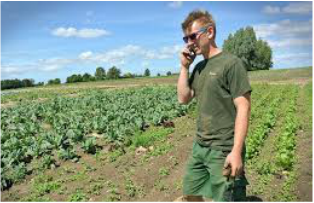 vegetable farmer - pixabay.com
vegetable farmer - pixabay.com I remember the days of 'back to the earth' lifestyle and growing my own fruit and vegetables in the early seventies.
My vegetable garden in Australia grew abundant bounty—tomatoes, marigolds among herbs, parsley, snow peas, Jerusalem artichokes and carrots. I laid paving slabs as walkways between the plots, and fertilized the soil with chook droppings taken from beneath the hen perch. Several restaurants called in for parsley, which I sold for a meagre amount of cash.
I added other goods for sale in the craft shop—spun wool from our own sheep, knitted jumpers to order, along with patchwork quilts.
People around the world live that same lifestyle, like Amy over at the Vomiting Chicken, who grows wonderful food in her extensive garden, raises chickens and home-schools her youngest child.
Now, a company in Japan is building an indoor lettuce farm that will be completely tended by robots and computers. The company, named Spread (vegetable farm), expects the factory to open in 2017. They say the fully automated farming process could make the lettuce cheaper and better for the environment.
Spread already tends several large indoor farms. The multitude environmental benefits include:
Plants can be grown hydroponically without exhausting soil resources.
Up to 98 percent of the water will be recycled.
The factory won’t have to spray pesticides, since the pests are outdoors.
Artificial lighting means the food supply won’t rely on weather changes.
Lighting can be supplied through renewable energy.
Currently Spread grows about 7.7 million heads of lettuce a year under the name 'Vegetus', and sells them at about the same price as regular lettuce.
Although modern indoor farms to have temperature, humidity, light, and CO2 controlled automatically by a computer, the Japanese company hopes to have the entire process run by robots, from seeding to harvesting.
However, the Wall Street Journal reports that the company is struggling to construct a machine that can plant the seeds, and their process still requires human eyes to determine whether a seedling has sprouted.
Ha. I knew robots could never replace a proper farmer. Mankind's earliest change from hunter-gatherers came when they decided to plant and grow their own food, thereby remaining in a fixed position—the home.
Do you see a future where the farmer is replaced by robots?





 RSS Feed
RSS Feed
